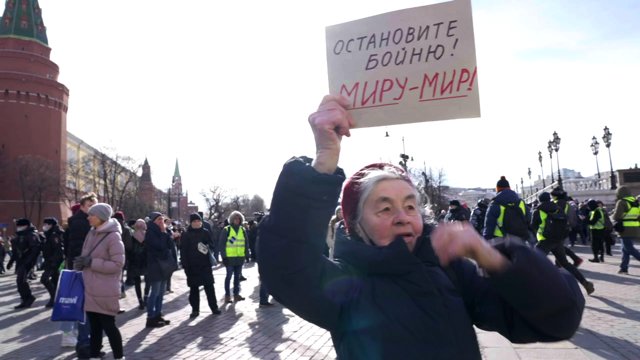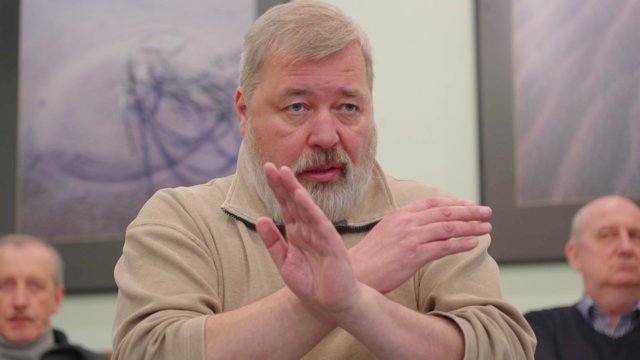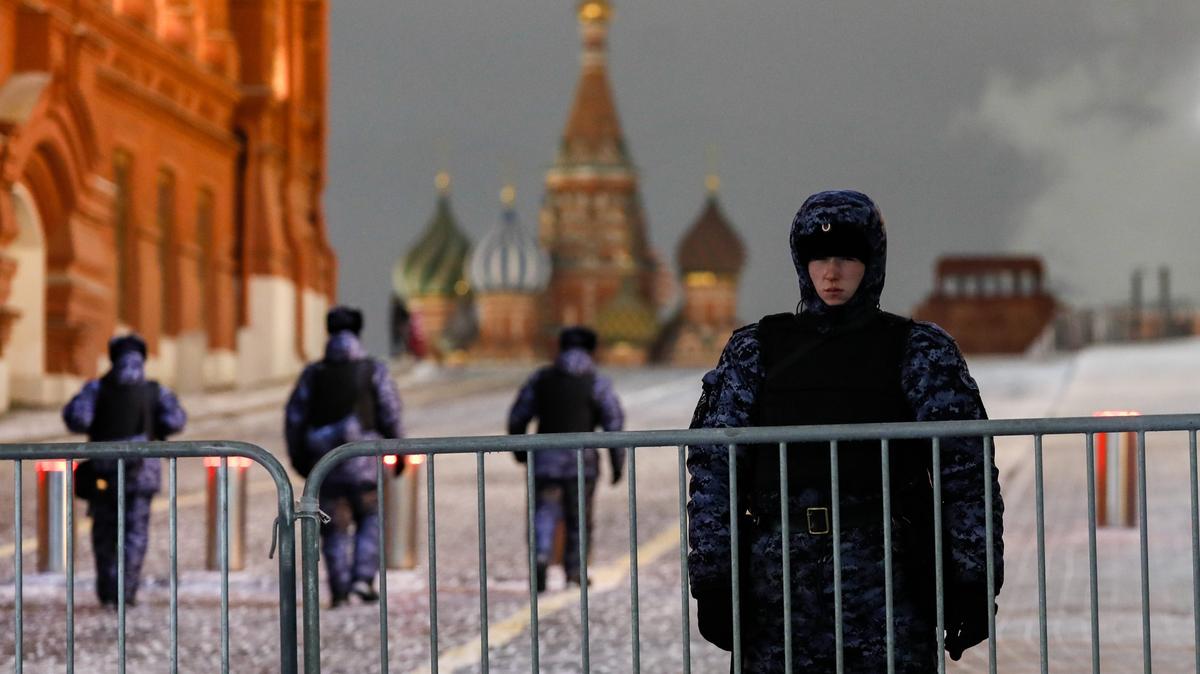While Putin’s Russia has for years been notorious for the gruesome punishments — both judicial and extrajudicial — meted out to journalists, the silencing of independent media outlets reached unprecedented new heights following the full-scale invasion of Ukraine in 2022. How those who found themselves in the Kremlin’s crosshairs responded to their new reality forms the subject matter of a new documentary by Askold Kurov and Anonymous1.
Disclaimer: While Of Caravan and the Dogs was co-produced by Novaya Gazeta Europe and multiple members of staff were interviewed for the documentary, the writing and editing of this piece has been done without the involvement of anyone connected to the production.
Shortly after launching its war in Ukraine, the Russian government adopted laws effectively making any balanced reporting on the war a crime, let alone public criticism of the Kremlin’s aggression against its neighbour. The new laws introduced in March 2022 forced some of the most trusted and best-known newspapers, TV channels and radio stations in the country to either end their activity or go into exile.
This pivotal moment in contemporary Russian history was captured on camera by directors Askold Kurov and Anonymous1, and the result is their film Of Caravan and the Dogs. By attending crucial meetings in the newsrooms of Novaya Gazeta, TV channel Dozhd and radio station Ekho Moskvy, as well as witnessing equally fraught decisions being made by the staff of Memorial, one of Russia’s oldest human rights organisations, the film already feels like a historical document and provides a fascinating insight into the struggles faced by those determined to continue working despite the increasingly untenable conditions and ever-rising threat of arrest.
Kurov, who produced Welcome to Chechnya, a documentary shot in secret about the brutal persecution of LGBT people in one of Russia’s most conservative regions, and who also worked on Winter, Go Away, a documentary about the 2011-2012 anti-government protests in Moscow, has himself been forced to leave Russia since shooting the film. Novaya Europe spoke to him about making the documentary and asked him how his understanding of the events he witnessed had changed in the two years that have since passed.
NGE: When did you conceive the idea of making this film? Was there a “last straw” in terms of the repressive measures you witnessed?
AK: We started shooting the film in 2021. Initially, we conceived it as a film dedicated to the 100th anniversary of the philosophers’ ships [Soviet ships that took prominent philosophers into exile] that set sail in 1922. We thought there were very direct parallels here. At that time all the foreign agent laws were already in place, and they were already making the lives of many people in Russia very difficult or impossible. This meant that people were being forced to leave their homeland in order to continue working, just as they were 100 years ago.
So, we started searching for foreign agents in Russia. At first, we didn’t want to pick media organisations. We were looking for different, less obvious foreign agents, who were more or less ignored by journalists.
But at the same time we also started shooting Memorial, which by that time had been recognised as a foreign agent, and the legal process to dissolve it was already underway in the Supreme Court. Those were some of the first shots. And we had a big question right from the start, why did what happened to Memorial, one of Russia’s oldest human rights organisations, turn out to be something so unimaginable, something so beyond all expectations? Only when the war started did everything begin to fall into place, and it became clear that all of this was being done in preparation for war, which explained why the authorities considered their main enemies to be those who are unafraid to call things by their names, who speak the truth. That’s why in the end Novaya Gazeta, Dozhd, and Ekho Moskvy became central to the story.

Still from Of Caravan and the Dogs, directed by Askold Kurov and Anonymous1
NGE: Many of the characters in your film expressed irony about their “foreign agent” status in 2022. Do you think anything has changed in their awareness about this over the past two years?
AK: From the very beginning, I had a feeling that this law, which initially had few immediate consequences for those it targeted, was more of a preliminary marking. It seemed that the authorities simply wanted to mark up Russian society so that they could gradually tighten their repressive screws and at a later stage would be able to persecute anyone who had already been designated a foreign agent or some other kind of undesirable element simultaneously.
NGE: Did you expect that the crushing of media freedom would reach the level it has now when you were making the film?
AK: Unfortunately, yes, which is why I left Russia, as I considered it unsafe. There was no hope. After all, why would the authorities suddenly stop and somehow relent after all they’ve accomplished, given that all this oppression has worked out so well for them?

Former Novaya Gazeta editor-in-chief Dmitry Muratov during an editorial meeting in a still from Of Caravan and the Dogs. Photo: Askold Kurov /Anonymous1
NGE: What mood prevailed in the newsrooms you filmed at that time and how would you describe their overall atmosphere?
AK: I think the atmosphere was changing. It varied. Initially, there was a sense of resistance. There was also optimism because these people were accustomed to fighting to the end, and believed they could always find a solution or another way to continue doing their work.
Our film starts with [former Novaya Gazeta editor-in-chief] Dmitry Muratov’s Nobel acceptance speech, in which he uses the phrase that gave the film its name: The dogs bark, but the caravan goes on. When Muratov returns to the editorial office, everyone is delighted and congratulates him, and part of the Nobel Prize money is even shared between the staff. In their conversation in the office, [Novaya Gazeta contributor] Dmitry Bykov tells Muratov he has a premonition that the year was going to a very tough one for the paper, to which Muratov replies, “Just like the past 17 years, and for the past 17 years, it’s all been coming true.”
While there was a feeling that people had already been living in such a state for a long time, there was always hope and always some way to continue.
The same was true for Dozhd, during their New Year’s broadcast when [editor-in-chief] Tikhon Dzyadko announced the TV channel’s slogan for the year 2022: “We won’t disband, no matter what.” There was a sense that everyone was determined to continue and resist.
But then everything escalated so quickly that, I think, it was difficult for the protagonists themselves to keep up with the changes. Sometimes people ask me if I felt the effects of the war. And I tell them that it’s very difficult for me to talk about it because it’s such a central event in my life. I hadn’t experienced anything like it before or since. It’s incomparable, and it seems that everyone felt similarly — it was something that didn’t fit into the sequence of events either beforehand or afterwards. In the end, when Dozhd suspended its broadcasts, [founder and CEO] Natalia Sindeyeva admitted that its staff had never faced such a difficult decision in their lives before.
NGE: What was it like for you to film these final moments in newsrooms preparing to shut down? Did it seem to you even then that the footage would be truly historic?
AK: I didn’t even think about it, as when you’re filming, you’re so immersed in the events that you’re inside the story. That’s partly because it’s very difficult to step back. A painter might approach a painting, add a brush stroke, then withdraw to see the picture from a distance, but we didn’t have the time or the energy for that. Everything was happening very quickly, very intensively. I think I’m only starting to realise now that the film is actually a very important document.
NGE: How has the film been received so far?
AK: The film has now been shown to international audiences at several festivals, for example, in The Hague, Copenhagen, and Switzerland. Dmitry Muratov, Kirill Martynov, and Marianna Komissarova, the UN Special Rapporteur on Human Rights, were all present for one very good discussion. Seeing your film through the eyes of the audience is a very different experience, not least as what we captured on film has turned out to be a major historical turning point of sorts. We became witnesses to what was unfortunately a tragic event, but I would still like others to witness what we did.
NGE: What do foreign audiences most frequently ask you at these screenings?
AK: The most frequent and perhaps the main question is whether there is any hope that the situation might change, that the war will stop, that things might go back to normal? Because there’s a segment in the film where on the first day of the war, Muratov says that all hope now lies with those Russians prepared to protest against the war and who might even be able to stop it. But it quickly became apparent that even this hope was in vain due to the severity of the government’s response, and because there are now too few people remaining in Russia who are willing to take to the streets.
I answer those questions by saying that I place all my hope in precisely the same people, in those we follow in the film, people for whom freedom and truth have become more important than life itself.
As long as there are people willing to risk everything for these principles, there will be hope.
NGE: Do you plan to make a follow up film?
AK: There will definitely be a next instalment of the story, and I definitely hope that we will be the ones who get to make it, and I believe that it will happen in the foreseeable future, and that we will all be able to return to Russia, that Dozhd and Ekho will be able to broadcast again, if not from the old studios, then from some new ones. And that Novaya Gazeta will be printed again and sold at newsstands.
NGE: What message would you like international audiences to take away from this film?
AK: I would like them to understand what can happen to any society if we don’t work every day to preserve democracy and freedom of speech.
Join us in rebuilding Novaya Gazeta Europe
The Russian government has banned independent media. We were forced to leave our country in order to keep doing our job, telling our readers about what is going on Russia, Ukraine and Europe.
We will continue fighting against warfare and dictatorship. We believe that freedom of speech is the most efficient antidote against tyranny. Support us financially to help us fight for peace and freedom.
By clicking the Support button, you agree to the processing of your personal data.
To cancel a regular donation, please write to [email protected]

